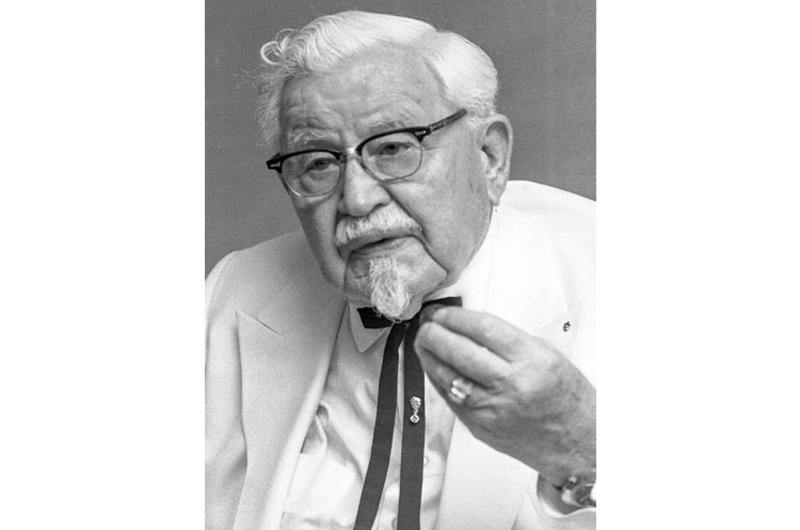Colonel Sanders in Tokyo, 1972

Tokyo, Japan, October, 1972: Harlan Sanders, founder of the Kentucky Fried Chicken restaurant chain, makes a point during an interview with Stars and Stripes at the Tokyo Hilton.
By BRAD ANSETH | STARS AND STRIPES October 18, 1972
TOKYO — "I don't believe in being the richest man in the cemetery ... do what you're going to do with your money as you go along," is how Col. Harland Sanders, the founder of Kentucky Fried Chicken, explains his philosophy towards wealth.
Sanders arrived in Tokyo Saturday for a week-long visit to the country and Kentucky Fried Chicken Japan. Officially. the visit has two purposes: to inspect and improve the operation of the franchise business and to prove to the Japanese people that Col. Harland Sanders is a real person.
Many Japanese think of Sanders as an advertising gimmick for an American quick-food restaurant.
But there are no gimmicks about the 82-year-old man who perfected a process for cooking chicken. Sanders believes that his money should help the needy and deserving through charities and foundations.
Six years ago when the government informed Sanders that it would take $900,000 in taxes if he should die, the colonel made a decision. "I figured that if I had to give $900,000 to taxes, I'd just as well give it away now and give away the government's money too."
At about that same time, Sanders sold his Canadian company and formed the Harland Sanders' Charitable Foundation in Canada.
"I gave the whole $6 million company to charity," Sanders explained. Since that time he estimates that he has given more than $600,000 for scholarships and thousands of dollars for hospitals through the foundation.
Education and children are two of the colonel's favorite philanthropic objects. "They (the older people) are getting taken care of pretty well by the government," Sanders explains.
"But the little tots can't help themselves ... they need help along the way."
Children and education seem to go together in the colonel's mind. "I recognize the need of a good education. I'm a sixth-grade dropout myself."
Because of automation Sanders believes that the scramble method he used to get to the top is losing its effectiveness. "They (younger generations) had better get the education. They won't have a chance if they take the rough and tumble, like I did."
Sanders limits his personal goals by saying, "you get more joy out of helping others than anything you do for yourself."
The colonel has one personal goal: "I'm an 1890 model. I just want to take care of my health. I've got 18 more years to go to finish this century."



